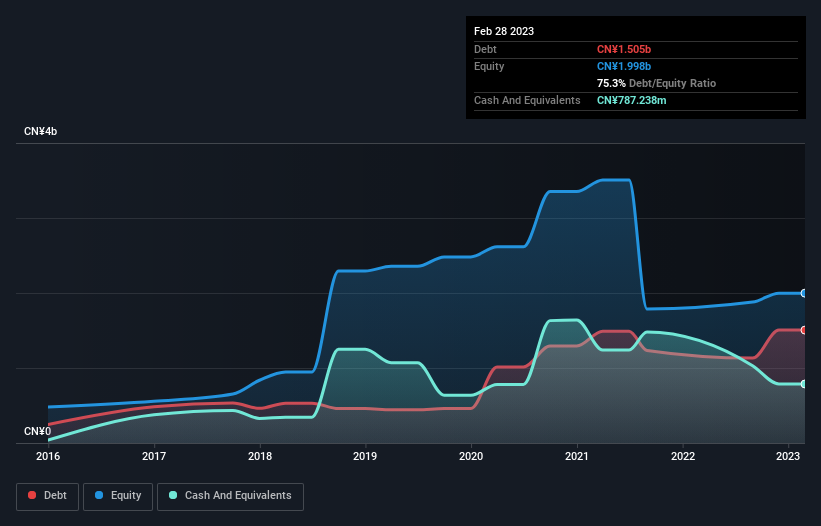- Hong Kong
- /
- Consumer Services
- /
- SEHK:1773
Here's Why Tianli International Holdings (HKG:1773) Can Manage Its Debt Responsibly

Legendary fund manager Li Lu (who Charlie Munger backed) once said, 'The biggest investment risk is not the volatility of prices, but whether you will suffer a permanent loss of capital.' So it might be obvious that you need to consider debt, when you think about how risky any given stock is, because too much debt can sink a company. We note that Tianli International Holdings Limited (HKG:1773) does have debt on its balance sheet. But should shareholders be worried about its use of debt?
When Is Debt A Problem?
Debt is a tool to help businesses grow, but if a business is incapable of paying off its lenders, then it exists at their mercy. Ultimately, if the company can't fulfill its legal obligations to repay debt, shareholders could walk away with nothing. However, a more common (but still painful) scenario is that it has to raise new equity capital at a low price, thus permanently diluting shareholders. By replacing dilution, though, debt can be an extremely good tool for businesses that need capital to invest in growth at high rates of return. The first thing to do when considering how much debt a business uses is to look at its cash and debt together.
See our latest analysis for Tianli International Holdings
How Much Debt Does Tianli International Holdings Carry?
You can click the graphic below for the historical numbers, but it shows that as of February 2023 Tianli International Holdings had CN¥1.51b of debt, an increase on CN¥1.23b, over one year. However, because it has a cash reserve of CN¥787.2m, its net debt is less, at about CN¥718.1m.

How Healthy Is Tianli International Holdings' Balance Sheet?
The latest balance sheet data shows that Tianli International Holdings had liabilities of CN¥3.60b due within a year, and liabilities of CN¥2.91b falling due after that. Offsetting these obligations, it had cash of CN¥787.2m as well as receivables valued at CN¥988.6m due within 12 months. So its liabilities total CN¥4.74b more than the combination of its cash and short-term receivables.
This deficit is considerable relative to its market capitalization of CN¥5.01b, so it does suggest shareholders should keep an eye on Tianli International Holdings' use of debt. This suggests shareholders would be heavily diluted if the company needed to shore up its balance sheet in a hurry.
We use two main ratios to inform us about debt levels relative to earnings. The first is net debt divided by earnings before interest, tax, depreciation, and amortization (EBITDA), while the second is how many times its earnings before interest and tax (EBIT) covers its interest expense (or its interest cover, for short). Thus we consider debt relative to earnings both with and without depreciation and amortization expenses.
Tianli International Holdings's net debt to EBITDA ratio of about 1.5 suggests only moderate use of debt. And its commanding EBIT of 14.2 times its interest expense, implies the debt load is as light as a peacock feather. Better yet, Tianli International Holdings grew its EBIT by 769% last year, which is an impressive improvement. That boost will make it even easier to pay down debt going forward. When analysing debt levels, the balance sheet is the obvious place to start. But ultimately the future profitability of the business will decide if Tianli International Holdings can strengthen its balance sheet over time. So if you're focused on the future you can check out this free report showing analyst profit forecasts.
Finally, a business needs free cash flow to pay off debt; accounting profits just don't cut it. So it's worth checking how much of that EBIT is backed by free cash flow. Looking at the most recent two years, Tianli International Holdings recorded free cash flow of 37% of its EBIT, which is weaker than we'd expect. That weak cash conversion makes it more difficult to handle indebtedness.
Our View
Tianli International Holdings's interest cover was a real positive on this analysis, as was its EBIT growth rate. On the other hand, its level of total liabilities makes us a little less comfortable about its debt. When we consider all the factors mentioned above, we do feel a bit cautious about Tianli International Holdings's use of debt. While we appreciate debt can enhance returns on equity, we'd suggest that shareholders keep close watch on its debt levels, lest they increase. There's no doubt that we learn most about debt from the balance sheet. However, not all investment risk resides within the balance sheet - far from it. For example, we've discovered 2 warning signs for Tianli International Holdings (1 is concerning!) that you should be aware of before investing here.
When all is said and done, sometimes its easier to focus on companies that don't even need debt. Readers can access a list of growth stocks with zero net debt 100% free, right now.
Valuation is complex, but we're here to simplify it.
Discover if Tianli International Holdings might be undervalued or overvalued with our detailed analysis, featuring fair value estimates, potential risks, dividends, insider trades, and its financial condition.
Access Free AnalysisHave feedback on this article? Concerned about the content? Get in touch with us directly. Alternatively, email editorial-team (at) simplywallst.com.
This article by Simply Wall St is general in nature. We provide commentary based on historical data and analyst forecasts only using an unbiased methodology and our articles are not intended to be financial advice. It does not constitute a recommendation to buy or sell any stock, and does not take account of your objectives, or your financial situation. We aim to bring you long-term focused analysis driven by fundamental data. Note that our analysis may not factor in the latest price-sensitive company announcements or qualitative material. Simply Wall St has no position in any stocks mentioned.
About SEHK:1773
Tianli International Holdings
An investment holding company, provides education management and diversified services in China.
Exceptional growth potential with outstanding track record.
Market Insights
Community Narratives



